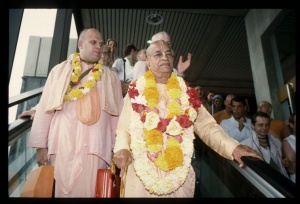SB 10.8.6

A.C. Bhaktivedanta Swami Prabhupada
TEXT 6
- tvaṁ hi brahma-vidāṁ śreṣṭhaḥ
- saṁskārān kartum arhasi
- bālayor anayor nṟṇāṁ
- janmanā brāhmaṇo guruḥ
SYNONYMS
tvam — Your Holiness; hi — indeed; brahma-vidām — of all brāhmaṇas, or persons who understand what is Brahman (brahma jānātīti brāhmaṇaḥ); śreṣṭhaḥ — you are the best; saṁskārān — ceremonies performed for reformation (because by these reformatory activities one takes one's second birth: saṁskārād bhaved dvijaḥ); kartum arhasi — because you have kindly come here, kindly execute; bālayoḥ — of these two sons (Kṛṣṇa and Balarāma); anayoḥ — of both of Them; nṟṇām — not only of Them, but of all human society; janmanā — as soon as he takes birth; brāhmaṇaḥ — immediately the brāhmaṇa becomes; guruḥ — the guide.*
TRANSLATION
My lord, you are the best of the brāhmaṇas, especially because you are fully aware of the jyotiḥ-śāstra, the astrological science. Therefore you are naturally the spiritual master of every human being. This being so, since you have kindly come to my house, kindly execute the reformatory activities for my two sons.
PURPORT
The Supreme Personality of Godhead, Kṛṣṇa, says in Bhagavad-gītā (BG 4.13), cātur-varṇyaṁ mayā sṛṣṭaṁ guṇa-karma-vibhāgaśaḥ: the four varṇas-brāhmaṇa, kṣatriya, vaiśya and śūdra—must be present in society. The brāhmaṇas are required for the guidance of the whole society. If there is no such institution as varṇāśrama-dharma and if human society has no such guide as the brāhmaṇa, human society will be hellish. In Kali-yuga, especially at the present moment, there is no such thing as a real brāhmaṇa, and therefore society is in a chaotic condition. Formerly there were qualified brāhmaṇas, but at present, although there are certainly persons who think themselves brāhmaṇas, they actually have no ability to guide society. The Kṛṣṇa consciousness movement is therefore very much eager to reintroduce the varṇāśrama system into human society so that those who are bewildered or less intelligent will be able to take guidance from qualified brāhmaṇas.
Brāhmaṇa means Vaiṣṇava. After one becomes a brāhmaṇa, the next stage of development in human society is to become a Vaiṣṇava. People in general must be guided to the destination or goal of life, and therefore they must understand Viṣṇu, the Supreme Personality of Godhead. The whole system of Vedic knowledge is based on this principle, but people have lost the clue (na te viduḥ svārtha-gatiṁ hi viṣṇum (SB 7.5.31)), and they are simply pursuing sense gratification, with the risk of gliding down to a lower grade of life (mṛtyu-saṁsāra-vartmani (BG 9.3)). It doesn't matter whether one is born a brāhmaṇa or not. No one is born a brāhmaṇa; everyone is born a śūdra. But by the guidance of a brāhmaṇa and by saṁskāra, one can become dvija, twice-born, and then gradually become a brāhmaṇa. Brāhmaṇism is not a system meant to create a monopoly for a particular class of men. Everyone should be educated so as to become a brāhmaṇa. At least there must be an opportunity to allow everyone to attain the destination of life. Regardless of whether one is born in a brāhmaṇa family, a kṣatriya family or a śūdra family, one may be guided by a proper brāhmaṇa and be promoted to the highest platform of being a Vaiṣṇava. Thus the Kṛṣṇa consciousness movement affords an opportunity to develop the right destiny for human society. Nanda Mahārāja took advantage of the opportunity of Garga Muni's presence by requesting him to perform the necessary reformatory activities for his sons to guide Them toward the destination of life.